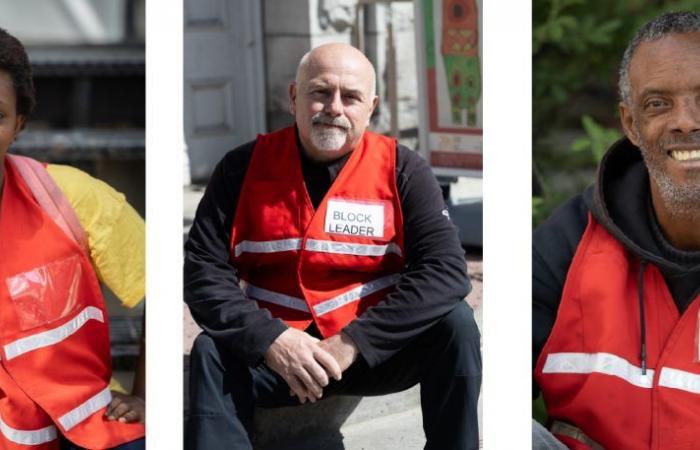Meet Block Leaders Melvis (left), Michel (middle) and Carlos (right).
It’s a warm late spring morning at the ByWard Market. Soon the streets will be filled with large buses and tourists eager to discover the country’s capital.
For now, everything is quiet, except for a group of people in bright red vests who walk around the market, inspecting the steps of businesses and peeking under stairwells.
They are Block Leaders, members of a new program that is changing the lives of some of Ottawa’s most vulnerable population.
Mobilize the dynamism of mutual aid between peers
In summer 2023, Ottawa Inner City Health (OICH) launched the Block Leaders pilot program, which helps support people who are homeless or using drugs by recruiting members of this community to serve as peer mentors . A year later, the program – and many of its participants – is thriving.
Every day in the ByWard Market, Block Leaders patrol in pairs to provide support to those in distress, help homeless people access beds in nearby shelters, and intervene in cases of overdoses. Block Leaders help local businesses by waking up people sleeping in front of their windows and offering them coffee and muffins. They also help keep their neighbourhood clean by picking up trash and drug paraphernalia.
Currently, more than 100 Block Leaders are enrolled in the program, where they travel the community for two-hour shifts, six hours a day, seven days a week. OICH pays Block Leaders for their time and provides them with training, including CPR and compassionate communication.
For more than 20 years, OICH has improved access to health care for people in our community who are homeless and have complex health needs, including those with chronic mental health and substance abuse issues.
“This program is about giving them hope and a sense of purpose,” says Rob Boyd, executive director of OICH. “Homeless people and people who use drugs are like the rest of us. Our needs are the same, and the things that will help them recover and integrate are the same as everyone else. They need a job, a home, a friend.”
“Good community mental health is about feeling like we belong, contribute, and have power over ourselves,” says Wendy Muckle, co-founder and former executive director of OICH , who is today a very active volunteer. “And the Block Leaders program, in its own way, lays the foundation for all of that.”
Team leader Kehinde prepares backpacks of supplies for the Block Leaders before they head out on their shifts, including cell phones (left), containers for collecting discarded needles and pipe before they leave for duty, including cell phones (left), containers to collect discarded needles and tubes (top right), and naloxone, a medication that can quickly reverse the effects of s (top right), and naloxone, a medication that can quickly reverse the effects of an opioid overdose (bottom right).
A program for vulnerable people, by vulnerable people
The Block Leaders program grew out of meetings OICH organized with people who were homeless and using drugs.
“They told us about the impact of fentanyl on the street community,” Rob recalls. “The survival instinct took over and things became more violent and people lost contact with each other. Then the pandemic hit, and their world turned upside down overnight. All their support systems collapsed and their ability to access care was limited. People who had experienced trauma and loss were experiencing them again. Many of us have returned to our pre-pandemic lives, but this community has not and continues to pay a heavy price. Add to that an affordable housing crisis and you have a perfect storm of systemic failures that impact the most marginalized people. »
The wider community is also feeling the effects of this change, says Wendy. “Today we find ourselves in a situation where the effects on this vulnerable population impact everyone – the people who live here, the people who visit the area and the businesses,” she explains.
It was this vulnerable population that proposed a solution. “They wanted to restore social norms within the street community, get back to pre-COVID and pre-fentanyl, and start caring about each other again,” says Rob. So they came up with the idea of the Block Leaders program. »
A year into the program, this shift in social norms is already underway, reports Wendy. “For example, among people who use drugs, there has always been this convention that when children pass by, someone issues a warning for others to put away or stop using their drugs. This convention disappeared with fentanyl,” she explains. “And now this convention is restored. »
The program also had an unexpected, but very welcome, result. “The program helped people prepare for employment. We didn’t anticipate it would happen this quickly, reports Rob. Some people left the program and found housing. »
Commercial and residential neighborhood sees difference
Zachary Dayler, general manager of the ByWard Market District Authority, which supports and represents the ByWard Market district, reports that local businesses are pleased with what they are seeing. “For example, some business owners have told me that Block Leaders have helped them deal with people coming into their stores and causing trouble. In the past, this probably would have led to a call to the police or security, but the Block Leaders spoke to them and defused the situation. »
Jamine Ackert is one of the residents who is also satisfied with what they see: less litter, now that the Block Leaders are helping to bring order to the neighborhood. “I thank them every day when I see them on the field. Everyone in my condo is excited,” says Jamine, who is president of the board of directors of a condo located next to the Shepherds of Hope shelter, where the Block Leaders program began. “Now I am returning the favor to Block Leaders by offering them conscious photography workshops at OICH.”
The ByWard Market District Authority has also partnered with OICH by welcoming Block Leaders to their market patrols. As the program is already promising, Zachary plans to expand it.
“The next phase would be to consider welcoming Block Leaders to other streets in the ByWard Market area,” he says, “and turning this pilot program into a permanent program. »
Testimonials from Block Leaders
“I like helping people, so this is the opportunity for me,” says Carlos, Block Leader, just before starting his shift. “I want to help people, save them and save lives. I try to help people even when I’m not on duty. »
“I fell in love with the program,” says Kehinde. Helping the community, enhancing it, saving people’s lives – I think that’s something lovely to me. It’s a program that I really liked. »
“I was Block Leader for nine months. Now I’m the Block Leaders supervisor, says Diane. These are all my children! They are so nice! »
The Ottawa Hospital and Ottawa Inner City Health: A decades-long partnership
“The Ottawa Hospital was instrumental in the creation of Ottawa Inner City Health and continues to provide us with a wide variety of support,” says Wendy.
Today, all OICH physicians also work at The Ottawa Hospital, a partnership that integrates care in hospitals and in the community. Former Ottawa Hospital Chief of Staff Dr.r Jeff Turnbull, co-founded OICH and, until recently, was the organization’s medical director, devoting his days to caring for some of our city’s most vulnerable patients.
Since Wendy and the Dr Turnbull founded OICH in 2001, the non-profit organization has become a pillar of our community, launching a range of programs and services to ensure that people facing barriers to good health receive the same quality of care than other Canadians.
Support patient care and research at The Ottawa Hospital
Other Useful Resources
The power of communities@lho
Last year, Macrina Valcin, RN, created an intricate display on her unit for Black History Month, transforming the unit’s bulletin board into a powerful celebration of Black people, culture, and history. This year, with the warm support and encouragement of a newly formed inclusive community, Macrina is bringing this passionate project to a much broader audience.
Gender Affirmation Surgery Program now accepting patients
The Ottawa Hospital’s new Gender Affirming Surgery Program is truly one of a kind. Launching in September 2023, it is the only program in Ontario that offers facial, chest and genital surgeries to transgender and non-binary patients. Plastic surgeon Dr. Nicholas Cormier and his team are pleased to announce that they are now accepting referrals from their physicians.
These volunteers turn chocolates and stuffed animals into MRI machines
We all know that a gift has the power to please the person who receives it. But did you know that the gifts you purchase at one of our gift shops also have the power to help us purchase valuable medical equipment? Our stores are run by a group of volunteers and employees of the Ottawa Hospital Auxiliary. Here are more ways their efforts are helping to bring about meaningful change.






